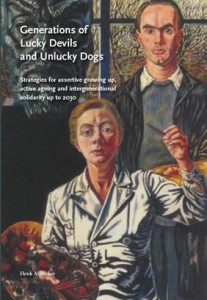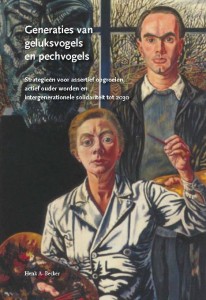About EuropeGenerations.com
This section accompanies the publication Generations of Lucky Devils and Unlucky Dogs – Strategies for assertive growing up and active ageing up to 2030.
Silver-grey manpower is a gold mine to society. One by one, the baby boom cohorts will reach the age of 65 starting from 2010. They are large cohorts, relatively well educated and healthy with considerable pension and health care rights. In short, they are lucky devils. As a result of ageing, cohorts that were born in 1985 onwards and that enter the labour market as from approximately 2010 will be required to pay many additional taxes during the course of their entire working life spanning more than forty years. They are, in short, unlucky dogs. Redistribution of joys and burdens could trigger conflicts between generations. A better solution is to identify and deploy society’s hidden resources.
Taking this issue as a basis, the book in hand explores strategies that enable senior citizens and young people to give meaning to solidarity among generations, for a start in 2012 as the European Year for Active Ageing, but also as part of Europe 2020, the European Commission’s 2010-2020 strategy.
With these two strategies journalists and television producers will swing into action. In secondary and higher education as well as in universities more papers on life courses and patterns of generations will be written than ever before. Senior citizens’ unions but actually all social organizations will organize lectures. Educated laymen will wish to go deeply into this issue.
English Edition: ISBN 978 90 361 0275 9
Deze website ondersteunt de publicatie Generaties van geluksvogels en pechvogels. Strategieen voor assertief opgroeien, actief ouder worden en intergenerationele solidariteit tot 2030.
Grote maatschappelijke gebeurtenissen smeden losse aantallen tijdgenoten tot generaties samen. Elke generatie heeft met bedreigingen en kansen te maken. Elke generatie herbergt geluksvogels en pechvogels. Bij sommige generaties gaat het om relatief veel geluksvogels, bij andere om relatief veel pechvogels. De geluksvogels proberen hun gunstige positie te behouden en zo mogelijk te versterken. De pechvogels doen hun best om hun lot te verbeteren. In onze tijd moeten de jongere generaties assertief hun kans op gunstig opgroeien en een stevige economische positie verdedigen. De oudere generaties vormen met hun zilvergrijs menselijk kapitaal een goudmijn, die wij in de komende decennia hard nodig zullen hebben om de te verwachten reeks explosies van de demografische tijdbom op niveau te overleven.
Dit boek biedt achtergronden en richtlijnen voor:
- sprekers in bijeenkomsten over de dynamiek van het patroon van generaties en andere ervaren leken en deskundigen;
- media deskundigen, die ons willen informeren over het beleid van de Europese Unie voor de jaren 2010 tot 2020, alsmede het Europese jaar 2012 over Actief Ouder Worden als aanjager tot ‘Europa2020’;
- scholieren in VWO en studenten in HBO en universiteiten, die in hun werkstukken en presentaties generaties willen behandelen;
- senioren die individueel of in hun organisaties actief ouder worden vorm willen geven;
- wetenschappers, die reeds generatieonderzoek verrichten of die de weg willen vinden naar de ‘state of the art’ in dit wetenschapsgebied.
Het boek is afgestemd op een brede lezerskring. In enkele duidelijk aangegeven tekstfragmenten staan verwijzingen naar de vakliteratuur.
Nederlandse editie: ISBN 978 90 361 0277 3
Henk A. Becker was born in Greifswald, Germany, in 1933. In 1946 he emigrated to the Netherlands, where he obtained his sociology degree (cum laude) at Leiden University in 1958. From 1956 to 1964 he held a staff position within a government ministry.From 1964 to 1968 he was the head of the research department of the Sociological Institute at the Netherlands School of Economics, which today is Erasmus University Rotterdam. He took his doctoral degree there in 1968 with a thesis on management careers, which concerned an early version of a normative career analysis and of a computerized career simulation. The University of Utrecht appointed him professor of sociology as well as of methodology of social research in 1968.
He was dean of both a faculty and a sub-faculty and a committee member of science associations in the Netherlands and abroad. In 1996 he was knighted in the Order of the Netherlands Lion (Ridder in de Orde van de Nederlandse Leeuw). In the year 2000 the International Association for Impact Assessment presented him with the Rose-Hulman Award for his work on demographic impact assessments.
In 1998 he turned 65 and was accorded emeritus status, since which time he continues his scientific work on a part time basis.

